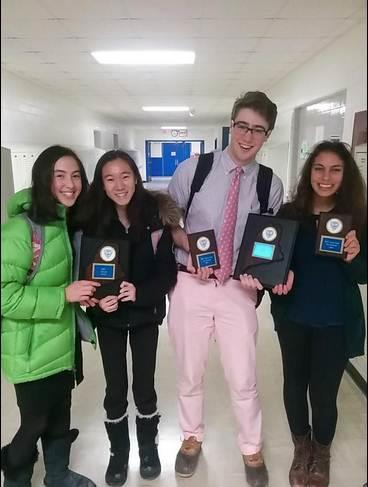-

Why do Speech and Debate?
New Trier debate wants YOU! Thinking about joining the team? Curious about what New Trier debate is about? Below is a brief explanation of different types of debate.
What is debate?
Policy debate is a form of research-based competition in which teams of two advocate for or against a resolution that calls for policy change by the United States federal government. Students present affirmative or negative speeches as well as conduct a cross-examination period in which they question their competitors. Resolutions for Policy debate change every school year.
Lincoln Douglas debate centers on a proposition of value, which concerns itself with what ought to be instead of what is. A value is an ideal held by individuals, societies, governments, etc. Debaters are encouraged to develop argumentation based upon a values perspective. To that end, no plan (or counterplan) will be offered by the debaters. In Lincoln Douglas Debate, a plan is defined by the NFL as a formalized, comprehensive proposal for implementation. The debate should focus on reasoning to support a general principle instead of particular plans and counterplans. Debaters may offer generalized, practical examples or solutions to illustrate how the general principle could guide decisions.
Public Forum debate is where debaters work in pairs (teams) to address the month's topic, either from the affirmative side (to advocate the resolution), or the negative side (to prove how the resolution is flawed). Argumentation includes a constructive case, cross-‐examination, and refutation. Skills learned include refutation, questioning, organization and communication.
Congress debate is individual debate in a large group setting. Legislative debaters research and write pieces of Congressional legislation that they feel will better the society in which we live. At a tournament, debaters will then speak on the legislation while using proper parliamentary procedure. Judges score each competitor based on argumentation ability, speaking technique, knowledge of parliamentary procedure, and overall participation.
**The above summaries, with the exception of the Public Forum one, were taken from the National Forensic League Competition Events Guide , Version 2.0, published January 31, 2011. Reading this guide will provide a more in-depth look at rules and procedures for each of the events.
Why debate for New Trier?
Debate is a fun activity well-suited for competitive spirits and those partial to arguing over anything and everything. Debate teaches students important research, analytical, and articulation skills that would be valuable in any career. Many debaters go on to become highly successful lawyers, scholars, and politicians (including many of our former Presidents). Debate can also be an opportunity for many students to open doors for collegiate education with a slight admissions bump or even a scholarship. At New Trier, debaters can travel all over the country on a nationally competitive debate team from Los Angeles to Atlanta to Boston.
How do you join New Trier debate?
Mr. Vinson and Mr. Weston are the head coaches of New Trier's Debate team. You can visit Mr. Vinson or Mr. Weston in person in room W433 at the Winnetka Campus or you can call Mr. Vinson at 847-784-6885 and Mr. Weston at 847-784-6891 or you can email Mr. Vinson at vinsona@newtrier.k12.il.us or Mr. Weston at westond@newtrier.k12.il.us. Email is preferred.
What is speech?
Speech, or individual events, is a collection of different types of events individuals can compete in. Below is a brief overview of different events.Extemp
A contestant draws three questions, selects one, then has 30 minutes to prepare a speech in response, of up to seven minutes. The contestant utilizes files of published materials (books, magazines, newspapers, online sources) s/he has compiled as a resource for answering the question. The NFL divides extemp. into two separate events: United States (dealing with domestic issues), and International (issues beyond US borders).
Original Oratory
Orators are expected to research and speak intelligently, with a degree of originality, in an interesting manner, and with some profit to the audience, about a topic of significance. Although many orations deal with a current problem and propose a solution this is not the only acceptable form of oratory. Your oration may simply alert the audience to a threatening danger, strengthen its devotion to an accepted cause, or eulogize a person. An orator is given free choice of subject and judged solely on the effectiveness of development and presentation.
Interpretation
This includes categories of individual (solo) performance of dramatic (serious) and humorous literature, as well as duo performance of either emotive appeal, with selections drawn from published, printed: novels, short stories, plays, poetry, or other printed, published works. **The above summaries, were taken from the National Forensic League Competition Events Guide , Version 2.0, published January 31, 2011. Reading this guide will provide a more in-depth look at rules and procedures for each of the events.
Why compete in individual events for New Trier?
Competing in individual events is a great combination of students love of theatre and arts and competition. Individual events can also provide students with an outlet to choose their own path towards improving their speaking and acting skills. At New Trier, individual events competitors can travel all over the country from Dallas to North Carolina to Boston
How do you join New Trier individual events?
New Trier's individual events team is coached by Ms. Simons. You can email Ms. Simons at simonsk@newtrier.k12.il.us.

